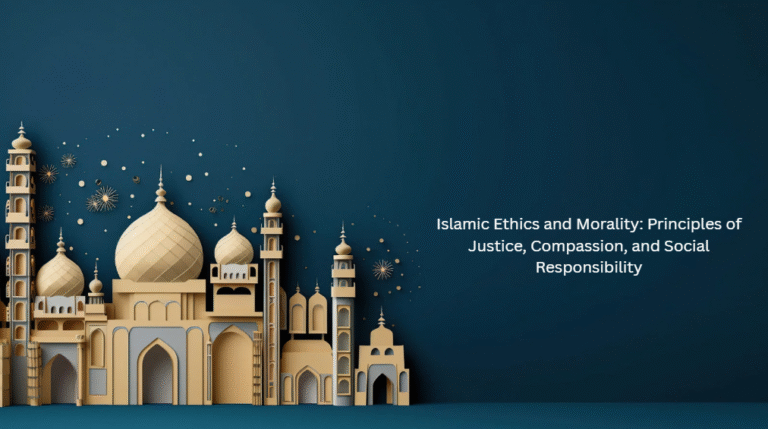Islam is not just a religious for worship. It is a full-fledged way of life. It completely guides the individual how to live in the society with others. Islamic ethics are the core of these guidelines. . The teachings of Quran Prophet (PBUH) serve as their foundations.
The core values of these teachings are compassion, justice and social responsibility. Social responsibility motivates people to work for well-being of others, justice guarantees the equality and protection of rights and compassion fills relationships with warmth and love. These values work together to bring social and personal harmony and peace in society.
What Are Islamic Ethics?
Islamic ethics are moral principles that direct a Muslim’s life. Prayer, fasting and worship are not the end of them. Rather, they also address how a person should talk, work and behaviours in daily life. At work, at home, in the market place and in society, Muslims are supposed to uphold moral lives. According to Prophet (PBUH) actions are evaluated based on intentions.
This demonstrates that morality in Islam starts from the heart. The action has worth, if it is done with good intentions. The Quran also encourages individuals to be loyal, truthful, patient and helpful. It cautions against fraud, lying and hurting other people. Islamic ethics thus influence a believer’s behaviours on the outside as well as their inner character.
Justice in Islamic Ethics
Justice is among the most significant teachings of Islam. According to Quran, Muslims should uphold justice, even if it goes against who they are or they are related to. This proves that Islam values justice more than wealth, power or self-interest. Justice must come first everywhere. Parents should treat their kids equally in home. When it comes to business, it means not to compromising on quality, price or weight. In leadership, leader must treat people with integrity and honesty and prevent from misusing their authority.
Justice also blocks oppression and defends the weak. Islam serve as a reminder that justice shall be decided in the Hereafter. Every unfair act should be exposed before Allah. One is careful when interacting with people because of this belief. Justice maintains social balance and safety. Communities collapse and people suffer without it.
Compassion in Islamic Morality
Compassion is another important value. Generosity, mercy and caring about others all are example of compassion. The Quran describes Prophet (PBUH) as a mercy to all the worlds. This shows that compassion in islam is not just for Muslims but also for everyone including animals and even environment. Compassion shows up in small things you do every day.
Acts of generosity include assisting others, visiting the sick, feeding the needy and forgiving faults. A simple smile is regarded as charitable gesture. These small deeds promote togetherness, love, care and respect among individuals. The zakat system is another example of compassion.
Giving away a portion of one’s wealth, usually 2.5% of savings, to help people who are in need is mandatory for Muslims who meets the financial criteria. Muslims exemplifies the virtues of compassion, charity and justice by helping the poor, supporting community projects and taking care of orphans.
Social Responsibility in Islam
Islam places a great emphasis on social responsibility in addition to justice and compassion. A Muslim is responsible for the well-being of others, not just for himself. The Prophet (PBUH) said that The best of people are those who are most beneficial for others.
This shows that serving and assisting others is where genuine kindness may be discovered. Home is where social responsibility starts. Parents need to foster a strong sense of faith and good manners in their children. Parents must be treated with respect and care by their children. Friends, neighbours and even stranger have rights. Muslims are taught by Islam not to hurt their neighbours in any circumstances and to share in their happiness and sufferings.
Social responsibility involves opposing injustice, safeguarding society and supporting what is best for everyone on large scale. It also includes promoting education, conserving the environment and fighting against corruption. It is especially the responsibility of leaders to serve others with honesty. This approach fosters a society in which each person protects the rights of others.
The Connection between Justice, Compassion, and Social Responsibility
These three values are closely related to one another. Kindness and mercy foster by compassion. Equality and fairness is guaranteed by justice. Social responsibilities ensure that these values are applied in daily life. They create a robust society when they work together. People experience oppression in the absence of justice. Justice seems harsh and heartless without compassion.
Values are just words without actions when social responsibility is lacking. These principles work together to foster peace, harmony and togetherness. For example, to fight against poverty, social responsibility sets up systems like zakat to help those who are needy. Compassion motivates people to donate and justice assures that wealthy do not unjustly keep their wealth. This explains how these values connect to address social issues.
Islamic Ethics in Today’s World
Unfairness, disrespect of the helpless and selfishness are just few issues facing the world today. While some are extremely wealthy, many people live in poverty. Societies are also harmed by pollution, wars and corruption. These problems are clearly sort out by principles of Islamic ethics.
Human rights can be secured and oppression can be avoided through justice. People from different regions can become more united and less hateful when they have compassion. Equitable system for society, health and education can be established through social responsibility. Applying these values can make society healthier and peaceful.
